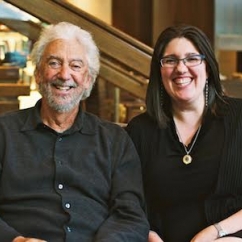Articles and News
Why Jewelry Retail Is Struggling to Reverse Its Two-Decade Decline April 01, 2024 (0 comments)

Las Vegas, NV--Jewelry retail in the US has been declining steadily for more than 20 years, and 2023 was no different. The number of jewelry retailers fell by 2.8% to 17,554 last year, according to the Jewelers Board of Trade.
[Fox’s Seattle third-generation owner Zoey Mann (right), pictured with her father, Chai.]
Fox’s Seattle, a business with a 112-year-old history, will be part of the statistic in 2024. Owner Zoey Mann is closing the business in downtown Seattle, Washington, because she wants to spend more time with her family, she told Rapaport News. However, she cites changes in the way people buy jewelry and the slowdown in walk-in traffic in the city’s business district since the Covid-19 pandemic as additional factors.
Bill Boyajian, a jewelry industry consultant who often works on succession planning with retailers, pointed to several reasons why jewelry companies close. The long hours, the changing retail landscape and retirement are among them. Another major reason they go out of business is because they don’t make enough sales for either a family member or a buyer to take over. A jewelry retailer needs to gross at least $1 million even to have a chance of being a viable option for succession or buyout, he told Rapaport. But a business should be making at least $2 million a year.
“A $2 million business isn’t twice as good as a $1 million business. It’s four times as good. A $2 million business store is a nice business that can grow.”
Kyle Bullock, 31, is the fourth-generation owner Bullock Jewelry in Roswell, New Mexico. He also consults independent jewelers on how to grow their business.
Bullock believes the aging of the jewelry industry is the main reason why stores are closing.
“The biggest reason why stores are closing [is that] people are ready to retire. If you’re 60 years old, do you really want to see yourself working full time with all the stress of business ownership for the next 10 or 20 years? Most would rather not, and there’s nothing wrong with that,” he observed in an email interview. “The numbers just underscore an even bigger problem in the industry. We don’t have enough new leaders in the wings to keep another generation of independent stores going.”







